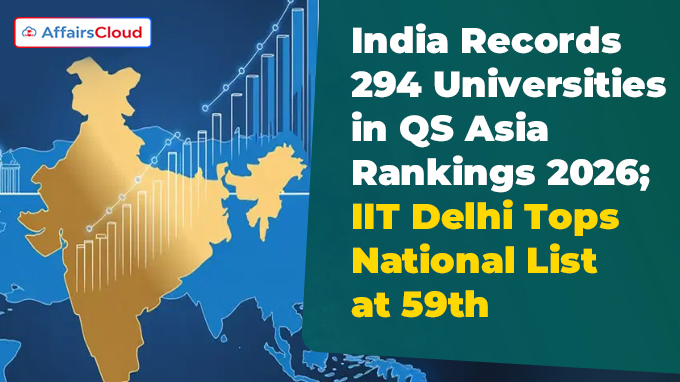In November 2025, the United Kingdom(UK) based global higher education analytics firm Quacquarelli Symonds (QS) released the QS World University Rankings: Asia 2026. As per the latest rankings Indian Institute of Technology (IIT)-Delhi has slipped to 59th rank and ranked first among the Indian universities with the overall score of 78.6 in 2026, compared to 44th position in 2025 and 46th in 2024.
- The University of Hong Kong(Hong Kong, Special Administrative Region, SAR) topped the list with the overall score of 100, followed by Peking University (China) (99.9) at the second place, while Nanyang Technological University(NTU) (Singapore) and National University of Singapore(NUS) shared the third place with a score of 99.
Exam Hints:
- What? Release of QS World University Rankings Asia 2026
- Who? Quacquarelli Symonds (QS)
- Edition: 17th
- New Indicators: Staff with a PhD, Student Exchange
- Leading Country: China (394 universities, 3 in top 10)
- Asia Top 3: University of Hong Kong (1st);Peking University (2nd); Nanyang Technological University and National University of Singapore (3rd)
- India Top 3: IIT Delhi (78.6), IISc Bangalore (76.5), IIT-Madras (75.1)
- Indian Universities in Top 100: 7 (IIT Delhi, IISc Bangalore, IIT Madras, IIT Bombay, IIT Kanpur, IIT Kharagpur, University of Delhi)
- Largest Improvement: Van Lang University (Vietnam) 251st rank (Asia).
- Top Gainer (India): Chandigarh University, Punjab (120 to 109)
About QS World University Rankings Asia 2026:
Overview: The QS World University Rankings Asia 2026, marks the 17th edition, featuring 1,529 universities from 25 locations.
Significance: The regional ranking, focused on higher education in Asia, includes unique indicators which are not included in the global rankings, such as “Staff with a Doctorate of Philosophy (PhD)” and “Exchange Students”.
- The weight of each indicator is adjusted to reflect the priorities and strengths of Asian universities, providing an accurate picture.
Ranking Methodology: The rankings include various indicators such as Academic Reputation, which accounts for 30%, Citations per paper (10%), Papers per Faculty (5%), Employer Reputation (20%), Faculty Student Ratio (10%), Staff with a PhD (5%), International Faculty Ratio (2.5%), International Research Network (10%), International Student Ratio (2.5%), Inbound Exchange Student (2.5%), and Outbound Exchange Indicator (2.5%).
Highlights of QS World University Rankings Asia 2026:
Other top 10 universities: It includes Fudan University (China) scored 98.7 in the QS Asia University Rankings 2026, ranked 5th; The Hong Kong University of Science and Technology (Hong Kong SAR) at the sixth place with the score of 98.5, City University of Hong Kong (CityUHK) (Hong Kong SAR) and the Chinese University of Hong Kong (CUHK) (Hong Kong SAR) (7th) (98.4), Tsinghua University (China) (9th) (98.3), The Hong Kong Polytechnic University (Hong Kong SAR) (10th) (97.1)
Leading Country: China has the highest representation with 394 ranked universities. It has 3 universities in the top 10; 13 in the top 50, and 25 in the top 100.
- In China, 48 universities improved their positions, with the Shanghai University of Finance and Economics climbing 103 spots to rank 283.
Other Leading Countries: Hong Kong has 11 universities, with 5 in the top 10 and 6 in the top 100; 9 improved, led by The Education University of Hong Kong, up 60 spots to 152nd.
- Japan has 147 universities, including 8 in the top 50 and 12 in the top 100; 11 improved, with Yokohama National University rising 13 spots to 241st.
- South Korea features 103 universities, with 6 in the top 20 and 15 in the top 100, and Yonsei University ranked 11th, the country’s highest.
Notable Movers: Van Lang University (Vietnam) scored 44.4, climbing 159 places to 251st.
- Nazarbayev University (Kazakhstan) scored 52.1, making the highest-ranking debut at 201st.
New Additions: The QS Asia Rankings 2026 features 552 new entries, making it the largest edition since its inception. China added 261 universities, the highest this year, surpassing India’s 137 new institutions, bringing India’s total to 294 compared to China’s 394.
Top 5 Universities in QS World University Rankings Asia 2026:
| Rank | University | Country | Score |
|---|---|---|---|
| 1 | The University of Hong Kong | Hong Kong, Special Administrative Region,(SAR) | 100 |
| 2 | Peking University | China | 99.9 |
| 3 | Nanyang Technological University(NTU) | Singapore | 99 |
| National University of Singapore (NUS) | Singapore | ||
| 5 | Fudan University | China | 98.7 |
Top 5 Indian Universities in QS World University Rankings Asia 2026:
| Rank | Regional Rank | University | Location | Score |
|---|---|---|---|---|
| 1 | 59 | Indian Institute of Technology (IIT)-Delhi | New Delhi (Delhi) | 78.6 |
| 2 | 64 | Indian Institute of Science (IISc)-Bengaluru | Bengaluru (Karnataka) | 76.5 |
| 3 | 70 | IIT-Madras (IIT-M) | Chennai (Tamil Nadu, TN) | 75.1 |
| 4 | 71 | IIT-Bombay (IIT-B) | Mumbai (Maharashtra) | 75 |
| 5 | 77 | IIT-Kanpur (IIT-K) | Kanpur (Uttar Pradesh, UP) | 73.4 |
Indian Universities in QS Asia University Rankings 2026:
Overview: India has 294 universities in the QS World University Rankings Asia 2026, including 7 Indian institutions in the top 100 such as IIT-Delhi, IISc Bangalore, IIT-Madras, IIT-Bombay, IIT-Kanpur, IIT-Kharagpur (West Bengal, WB) (77th) (73.4), University of Delhi (Delhi) (95th) (68.5).
Top Gainer: Chandigarh University(Punjab), the only Indian institution in the top 10 to improve its rank, moved up to 109 in 2026 from 120 last year.
Improvement: 36 Indian universities have improved their rankings, with Sathyabama Institute of Science and Technology (Chennai, Tamil Nadu, TN), climbing 111 places to 262nd rank.
Indicator rank: Maulana Abul Kalam Azad University of Technology, WB, with an overall score of 26.8) is ranked highest in the Papers per Faculty indicator with a score of 100.
Academic Strengths: The IITs continue to score highly in academic reputation, employer reputation, staff with PhDs, and papers per faculty, often in the 80s and 90s.
Faculty-Student Ratio: Scores range from 16.5 (IIT Kharagpur) to 40.9 (IIT Delhi), reflecting larger class sizes and limited resources versus top Asian universities scoring in the 80s–90s.
Regional Leadership: India outperformed China in papers per faculty, staff with PhDs, international research network, and inbound exchange students.
Research Recognition: Five Indian universities are in Asia’s top 10 for research productivity, 28 in the top 50, and 45 Indian institutions rank in the top 100 for staff with PhDs.
About Quacquarelli Symonds (QS):
Chief Executive Officer (CEO) – Jessica Turner
Headquarters – London, United Kingdom (UK)
Established – 1990





